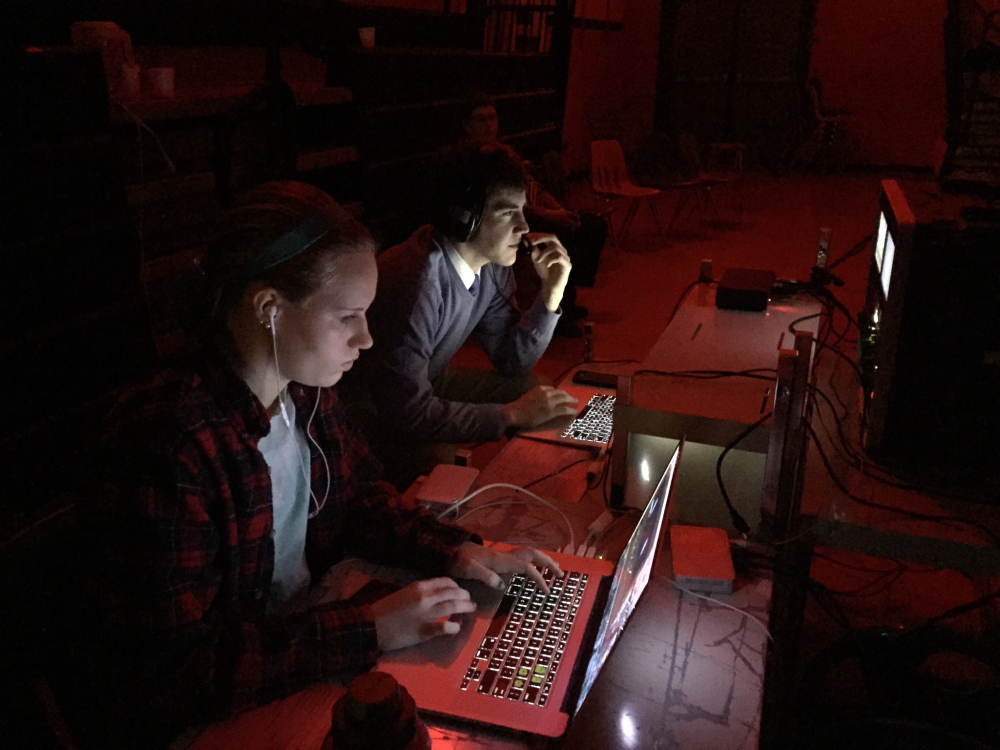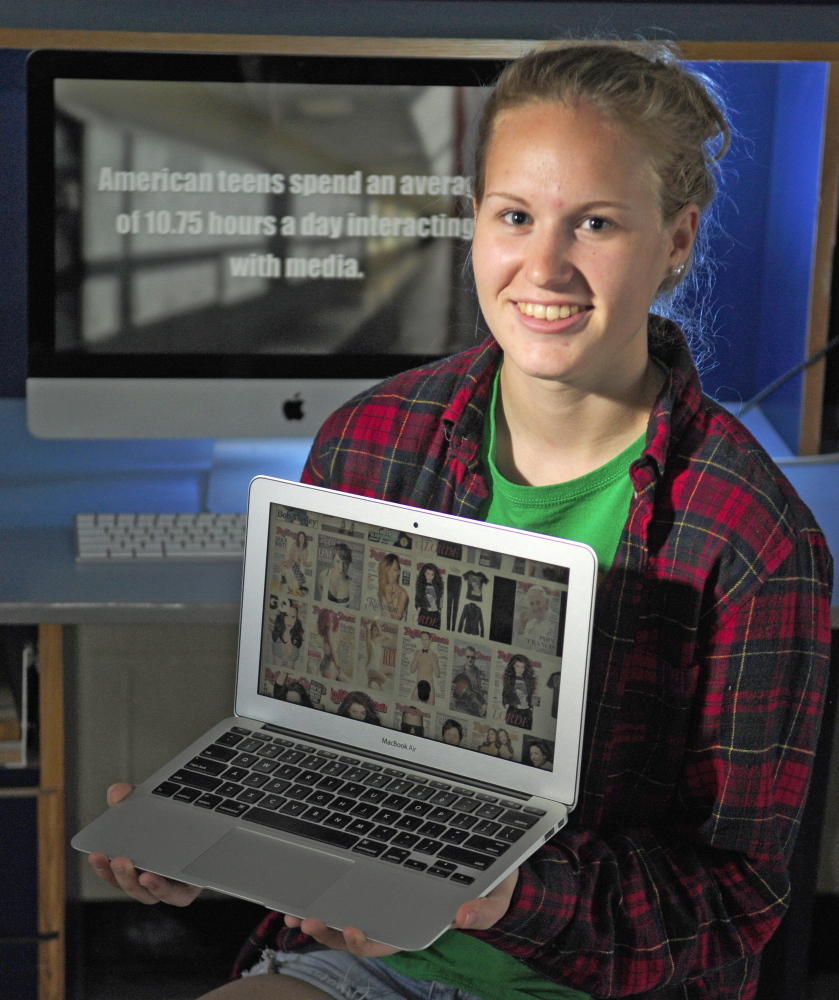GARDINER — After Emma Hickey watched a documentary on the representation of women in media in December, the high school senior stayed up until 2 a.m. researching the topic, inspired by the film’s call to action to change how women are portrayed.
“I had gone to bed and woke up, and I was like, ‘I can’t sleep, I need to do this,'” she said.
Soon after watching the documentary, “Miss Representation,” Hickey began making her own short film. She said her mother, although glad Hickey was passionate about the project, had to tell her she needed to do her homework too. Hickey made the video on her own, but her videography teacher at the high school, Rob Munzing, helped her condense it.
The Gardiner Area High School senior finished her five-and-a-half minute film, “Drop the Gender Mask,” in less than two months, showing it at a civil rights forum at school in February.
Hickey, 18, found out last month she’ll be awarded the Holocaust and Human Rights Center of Maine’s Mathilda Schlossberger Outstanding Student of the Year Award for the video. The center, located at the University of Maine at Augusta, will screen the film and honor Hickey at its annual meeting May 31.
“She took up a very relevant issue,” said Liz Helitzer, the center’s executive director, “something that a lot of students and adults combat with — the gender pressures that are present in the society, that are present in a wide variety of forms.”
She said this is the first time the center has chosen a video for the Mathilda Schlossberger award, which is open to students in kindergarten through fourth grade, fifth through eighth grade and ninth through 12th.
The award is given to a student with an exceptional piece of original writing or an unusually expressive work of visual or performance art relating to human rights, Helitzer said. The center looks for students who have something to say that is relevant and powerful and who also might be on the path to making a difference down the road, she said.
The issue of how genders are portrayed in media hasn’t been a focus of the center, but Helitzer said there are parallels between the messages that women need to dress or behave certain ways to be desirable and the propaganda Nazis were publishing about Jews and other groups of people during the Holocaust. Men nowadays also see and hear equally damaging messages, she said.
“The video addresses those issues head-on,” Helitzer said. “There’s not a lot of subtlety to it.”
The video is one of two advocacy videos Hickey has made. She also filmed a minutelong video for Spread the Word to End the Word, a national campaign to encourage people to stop using the word “retard.” In the short video, Hickey asks her peers at school to say what they like about her brother Jackson, who has autism and Down syndrome.
Hickey said the goal of her “Drop the Gender Mask” video, which also was selected as a top-10 video for Panasonic’s Kid Witness News National Contest, was to make people more aware of how people and gender roles are represented in media.
“Once you’re aware, you’re able to put a stop to it,” she said.
After she began looking for negative representations of girls and women in media, she noticed them everywhere.
“Once I started listening to the lyrics that are being played on the radio and, like, looking at ads and actually paying attention, it’s pretty scary to see what’s actually being said or represented, especially song lyrics,” Hickey said.
“We don’t even pay attention because it’s so catchy. We just automatically sing along.”
Hickey quoted lyrics in her video of a few popular songs, including 21-year-old country singer RaeLynn’s “God Made Girls.” The song opens with lyrics saying that God made girls because “somebody’s gotta wear a pretty skirt, somebody’s gotta be the one to flirt.”
One observation Hickey made during the filming of her video was a reluctance of her female classmates to discuss the issues on camera or even give serious answers, she said. She thinks some of her classmates might have been more willing to talk if they weren’t in groups when asked.
Hickey said she hasn’t dealt with serious body image issues personally, but she has friends who have had eating disorders. One friend, she said, was hospitalized for a couple of weeks and is “just getting over the mental aspect of it.”
At school, she said, it’s common to hear other girls putting down their own bodies and pointing out their flaws instead of what they like about their bodies.
“It’s just about recognizing what you like about yourself rather than always tearing yourself down,” Hickey said.
Hickey, who lives in Gardiner with her mother and brother, plans to attend the University of Wisconsin-Milwaukee next fall and to major in film and minor in women’s studies. She said she would like to do some type of film work as a career and continue advocating for issues affecting girls and women.
When asked whether people in her school are more aware of the gender issues raised in her film, Hickey said, “Overall, not really. I mean, it’s high school. Some people are struggling growing into their own bodies.”
Paul Koenig — 621-5663
Twitter: @pdkoenig
Send questions/comments to the editors.




Success. Please wait for the page to reload. If the page does not reload within 5 seconds, please refresh the page.
Enter your email and password to access comments.
Hi, to comment on stories you must . This profile is in addition to your subscription and website login.
Already have a commenting profile? .
Invalid username/password.
Please check your email to confirm and complete your registration.
Only subscribers are eligible to post comments. Please subscribe or login first for digital access. Here’s why.
Use the form below to reset your password. When you've submitted your account email, we will send an email with a reset code.